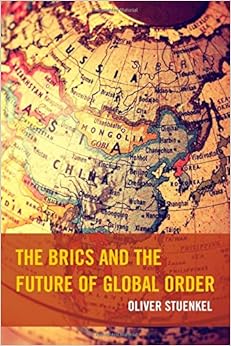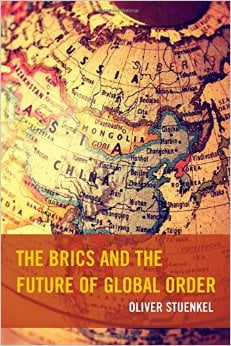
The discourse on the geopolitical and geoeconomic significance of BRICS has been polarised since Brazil, Russia, India and China met for the first time in 2009. One school of thought has treated the emergence of the BRICS forum as a reflection of a new, multi-polar world order; a result of the shift in economic and political power from the ‘global north’ to the ‘global south’. The opposing school of thought has dismissed the forum as a clunky cobbling of misfits with varying geopolitical ambitions and countervailing economic strengths: a Goldman Sachs marketing gimmick taken too far.
Both perspectives make for easy summarisation. But neither is useful for policy-makers or foreign policy analysts because the generalisations overlook the multi-layered, multi-dimensional engagement of the BRICS countries with each other and with the rest of the word.
Oliver Stuenkel’s book, The BRICS and the future of global order, plugs this gap. He is a scholar of international relations and has been contributing to the BRICS discourse for many years. The book provides a well-researched account of the evolution – starting from the forum’s inception in 2009 to the present – and the interactions between Brazil, Russia, India, China and South Africa on global issues.
Three dimensions of the book particularly stand out:
One, the analysis of how the BRICS forum has tried to exert its influence on global issues as a collective entity. The successful lobbying for the International Monetary Fund (IMF)’s quota reforms and the unsuccessful attempt to find a common candidate for leading the same are cases the author describes in detail.
Two, the detailed analysis of how the BRICS countries have engaged with each other under a common framework on 15 global issues such as agriculture, trade and national security. There is little or no global awareness of the engagement between these countries, for example, there is little knowledge that collaboration on agriculture and food security was one of the first initiatives by BRICS nations and that officials have met several times over the years to work on developing a common action plan. In a chapter appropriately titled ‘The hidden world of intra-BRICS Cooperation: Does regime type matter?’ Stuenkel fills this important gap.
Three, the assessment of how the BRICS countries have responded to geopolitical developments, especially their approach to the ‘responsibility to protect’ (R2P) norm, an international framework that enables a United Nations(UN)-led intervention in a sovereign country on humanitarian grounds. The book explains why the BRICS members adopted a common position on UN resolutions on intervention in Libya and in lesser known instances such as on issues concerning the Central African Republic, Sudan and Cote d’Ivoire, which often get overshadowed by the divergent positions the BRICS countries took on the resolution against Syria.
Overall, Stuenkel gives a detailed ‘under-the-hood’ assessment of the BRICS forum, which is a necessary corrective to simplistic conclusions of the forum’s potential or demise. He uses theoretical concepts of international relations to gauge the likely future trajectory of the forum. This project contains interesting insights but falls short of a comprehensive assessment. For that, the evolution of the BRICS forum will have to be studied in relation to the evolving multilateral economic architecture that includes the Asian Infrastructure Investment Bank (AIIB), the Trans-Pacific Partnership (TPP) and the influential role of the G20, all of which impact the BRICS forum in specific ways.
Stuenkel has correctly identified 2011 as a crucial year for assessing the geoeconomic and geopolitical heft of the BRICS forum, given that it was the year when all the BRICS countries, including India, were part of the UN Security Council. The next such year will be 2016, when China will hold the presidency of the G20 and India will hold the presidency of the BRICS forum. Stuenkel’s book is required reading for any scholar who wants to prepare for the year ahead and beyond.
[“source-gatewayhouse”]





